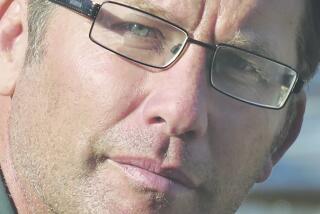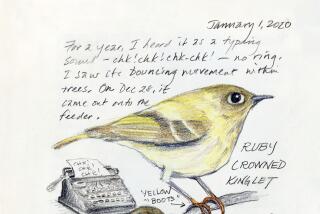Perspectives of a Modern Hunter-Gatherer : THE ISLAND WITHIN <i> by Richard Nelson (North Point Press: $18.95; 352 pp.) </i>
- Share via
This is a book about an island. More precisely, it is one man’s experience of living with an island somewhere in the Pacific Northwest, told through a series of graceful journal entries melded with deliberate, understated exposition of Richard Nelson’s world view. Thanks to its fluid language, “The Island Within” offers the illusion of facile reading; instead, it gets you with an afterkick.
How much longer will there be places where a family can live as participants in a natural, wild community? Nelson is sly about the location of the coastal village where he, his wife and stepson live. You are introduced to the island he explores through a generous supply of place names absent from the maps in this reviewer’s extensive collection. Southeast Alaska, British Columbia perhaps. A place where fishing and logging are the economic base.
The point of “The Island Within” is Nelson’s personal relationship with the landscape. The book opens and closes with deer hunts. Venison supplies his family’s meat larder, but Nelson is intent on revealing how he experiences these hunts. An anthropologist who lived with and has written extensively about the Athabascan Indians of central Alaska (“The Athabascans,” “Hunters of the Northern Forest”), he has adopted some of the principles and practices of the Koyukon Athabascan people into his daily life.
Nelson makes the point that he hasn’t traded off Euro-American culture, simply opened a window of additional experience. Indeed, he often offers asides on the Koyukon approach to his situations without claiming them as his own. Like his friends and literary brethren, Gary Snyder and Barry Lopez, Nelson experiences the world directly and clearly--objectively--while preserving its magic:
“The same deeper impulse that governs the flight of a deer governs the predator’s impulse to pursue it. I watch the first leaps without moving a muscle. Then, not pausing for an instant of deliberation, I raise the pack to my shoulder, follow the movement of the deer’s fleeing form, and wait until he stops to stare back. Almost at that moment, still moving without conscious thought, freed of the ambiguities that held me before, now no less animal than the animal I watch, my hands warm and steady and certain, acting from a more elemental sense than the ones that brought me to this meeting, I carefully align the sights and let go the sudden power.”
Most of Nelson’s accounts are less predatory, but none of them are sentimental. Climbing Mount Kluksa with a meditating fishery biologist friend and surfing partner--yes, surfing!--who chooses to be known in this book as “Topaz,” Nelson tears loose one of the shoulder straps on his backpack. “Fearing the trip might be ruined, I dig into the pack’s cluttered pockets, pulling out items that seem perfectly useless now--extra socks, notebook, binoculars, sandwiches, snacks . . . As my frustration mounts, a thought keeps spinning inside my brain: an old Eskimo hunter named Kavvik, advising me again and again, ‘Never go anyplace without dental floss.’ ”
After he and his family have observed and casually assisted in the annual orgy of the commercial herring harvest--a business Nelson questions without moral superiority--they boat off to do a bit of their own fishing:
“Ethan blurts out, ‘Here it comes!’ . . . The whale pours upward, surging toward the light like a phantom sheathed in silvery webs, then opens its cavernous maw and drives into the cloud of fish. A shrapnel of herring slide through the slick, bulging membrane of water. An instant later, an enormous prow bursts obliquely into the air. The whale rolls over on its side, surrounded by its own thrash and churning, mouth agape, pleated throat distended by the volume of water and fish it has taken in.”
On another solitary trip, lacking even the companionship of faithful and otherwise ubiquitous ex-sled dog Shungnak, Nelson revisits a sperm-whale carcass--killed, incidentally, by a fishnet tangled in its lower jaw:
” . . . a dark shape arises on the far side of the carcass. The bear looks my way, disappears, and then ambles into the open. Even from this distance I can tell she’s a big one. She lifts her snout and probes the air, gazes myopically along the shore, and comes around to the belly side. Shortly, the yearling scrambles out to join her, and they gnaw halfheartedly at cratered spots in the whale’s hide.”
Most of Nelson’s encounters are with somewhat less awesome creatures: Rufous hummingbirds in his garden, bald eagles by the score perched in trees along the estuary, a family of sea otters alongside his skiff, stormy petrels secretly leaving their burrow nests in the middle of the night.
Nelson’s self-taught natural history is sophisticated; the added insights gained from his years with the Koyukon people add another, satisfying dimension to his discoveries. Although he lacks the manipulative instincts of a scientist, Nelson interacts with these creatures on a common playing field.
I think Nelson’s purpose in “The Island Within”--other than to permit him to support a family in a place where sources of livelihood are few--is to offer an alternative perspective on living. His way combines features of traditional hunter-gatherer existence with the scientific knowledge and a smattering of the tools of contemporary humankind. He’s certainly not selling it; Nelson’s secrecy of locations is no accident. Nor does he sneer at the rest of us conducting our affairs in an almost entirely synthetic environment.
Perhaps as a means of generating a measure of the cadence customary to Western writing, where events head in some direction and are resolved, Nelson inserts a subtext of the illness and eventual death of his wife Nita’s mother in an unnamed suburban place. This desolate story effectively provides counterpoint to the cyclic timelessness of Kluksa Mountain.
“The Island Within” is unconventional writing, not for everybody. Nelson’s graceful English is cerebral, and his subject is, sadly, increasingly alien to most Americans. For some of us, however, it will fire up dreams of another life.
More to Read
Sign up for our Book Club newsletter
Get the latest news, events and more from the Los Angeles Times Book Club, and help us get L.A. reading and talking.
You may occasionally receive promotional content from the Los Angeles Times.










